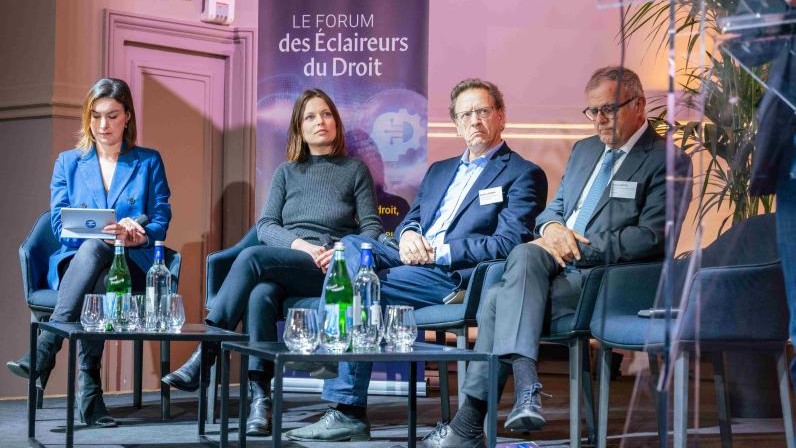Lamy Forum Roundtable from Les Éclaireurs du Droit.

“Authors challenged by machines”: focus on the first round table of the Forum des Éclaireurs du Droit
Written by Arthur du Mesnil, Delphine Deprez, Stavroula Koulocheri | Published on 07/05/2024
Read the article on the LAMY LIAISONS website

On April 22, 2024, the first edition of the Forum des Éclaireurs du Droit was held, organized by Éditions Lamy Liaisons. Among the speakers were philosophers, academics, lawyers, lawyers, lawyers, lawyers, lawyers, notaries, essayists and entrepreneurs who shared their knowledge and experiences on the theme of this meeting “AI and the practice of law, taking a step back from an ongoing metamorphosis”. Between wisdom, audacity and temperance, these experts sketched out a dividing line and illuminated the path for a particularly attentive audience. Focus on the first round table on the theme “Authors challenged by machines”.
Hosted by journalist Marjorie Paillon, this first round table of the first edition of the Forum des Éclaireurs du Droit, devoted to authors, brought together Betty Jeulin, a lawyer specializing in digital law and intellectual property law, Renaud Lefebvre, Director General of the Syndicat National de l'Édition (SNE) and Jacques Mestre, Professor of Private Law and Criminal Sciences, President of the French Association of Doctors of Law (AFA). DD) and emblematic author of Éditions Lamy.
Is AI a stimulating challenge?
Stakeholders initially questioned whether to Trust to artificial intelligence (AI) or to experts.
Jacques Mestre considers this to be a difficult question: the authors have a head start on the machines, but they are also challenged by them. The Professor does not fail to note that AI requires authors to Questioning, to surpass themselves, to reflect on what makes them unique. As a result, it is a source of progress staff. In addition, it of course already releases automatable tasks. But can an AI cover all facets of an author? To be an author is first of all to make choices, based on querying. In law, it is necessary to be able to doubt and make choices: is AI capable of it? Being an author is also nuance. Law finds its complexity and its humanity in nuance. Is AI capable of this? Being an author is finally anticipating societal and legal developments. Another challenge for AI.
In addition, AI requires increased vigilance in terms ofethics. Risks may arise such as plagiarism in the context of the preparation of a doctoral thesis for example. How to preserve personal work? How to identify works that have benefited from artificial support? The question arises in the same terms for legal consultations. Jacques Mestre thus pleads for a ethical obligation of transparency, to be compared with the purpose of the two new missions of the Higher Council for Literary and Artistic Property (CSPLA), the results of which are expected at the end of the year.
The legal challenges associated with productions generated by AI
While we have often tried to oppose publishers and defenders of AI, Renaud Lefebvre insists on the fact that we must naturally overcome this alleged quarrel: generative AIs having Need content to learn, the place of the human should remain powerhouse. There remains the essential question of training AI based on content produced and published by authors and publishers, content protected by copyright. One of the difficulties encountered by the publishing world is therefore that of the effectiveness of right to object (recognized by theDirective No. 2019/790 of 17 April 2019on copyright and related rights in the digital single market) to have its funds used to train machines.
The other point of attention is the recognition of a right of transparency, allowing the knowledge of the original works.
But another question remains unanswered: what about the status of productions generated by AI, and their possible protection by copyright or copyright? Betty Jeulin notes that the answers are currently not uniform, as China has for example admitted the production by copyright of a work entirely generated by an AI system, unlike other countries. She observes that the value chain is being shaken up by AI, but that AI urgently needs human interventions, human-generated content, which must be protected.
Even if it is still a bit early to know how the circuits will be set up, the Director General of SNE is calling for a regulation of learning AI, with a system of authorization and controls concerning the works used.
AI/authors: substitution or complementarity?
On this question, Jacques Mestre considers that it is necessary to first ask ourselves what the law is and what are its borders. For him, the possible involvement of AI actually depends on the How to exercise law : are we waiting for a precise, numerical answer? Or, conversely, more nuances, a margin of appreciation, psychology? In the practice of law, it is very often this second hypothesis that takes precedence. However, this is precisely what will be difficult for an AI to understand.
On the other hand, AIs can naturally provide assistance to lawyers (summary analysis, translation, etc.). However, you must be very vigilant in front of the risk of algorithmic hallucinations, which are inherent in any AI system. One human verification is therefore imperative.
Therefore, it is a question of complementarity and not of the substitution of man by the machine.
There is still the problem of ownership of this hybrid content, as is often the case, depending on the qualification of the work. Be that as it may, publishers are here in line with the role of mediator they have always played between authors and existing vectors of transmission, concludes Renaud Lefebvre, Director General of the Syndicat National de l'Édition.
The Forum Les Eclaieurs du Droit also questions within thethird round tablethe theme of “Does the algorithm free or enslave the lawyer?”. Then, he focuses on the close link between innovation and the legal professions by analysing “What new horizons for lawyers? ” within thesecond round table
